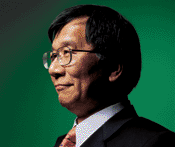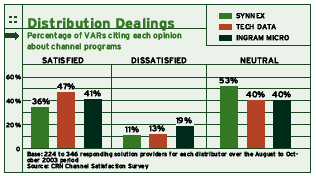Price Champion
Long considered a third stringer to Tech Data and Ingram Micro, distributor Synnex Information Technologies is poised to launch its IPO as early as next month and aims to once again bring "Big Three" back into distribution lexicon. Over the past few years, the Fremont, Calif.-based company, which will formally shorten its name to Synnex when it goes public, has quietly put together a string of acquisitions to bolster its distribution business. In 2001 Synnex acquired Merisel Canada and followed that up last year with the purchase of Gates/Arrow Distributing and License Online, a provider of Web-based software licenses.
But what's grabbed the attention of solution providers and competitors over the past year has been Synnex's aggressive campaign to snare market share by undercutting rivals on price. What everyone in the channel is watching now is whether Synnex's pricing salvo is simply a move to bolster revenue to make its IPO more attractive or whether it signals a fundamental, long-term change in the distribution landscape in which price and availability trump other value-added services.

\
Synnex President and CEO Robert Huang
\
Local VARs say Synnex is winning them over by helping them compete on price against national rivals such as CDW
Solution providers say that over the past year, Synnex has become extremely aggressive on pricing, notably on large PC deals, in an effort to win business away from its much larger competitors, Tech Data and Ingram Micro. In their most recent fiscal years, Ingram Micro reported revenue of $22.5 billion (fiscal 2002) and Tech Data reported revenue of $15.7 billion (fiscal 2003). In Synnex's fiscal year 2002, the company posted revenue of $3.77 billion. Smaller rival D&H Distributing reported revenue of $875 million in 2002.
Pete Busam, vice president and COO of Decisive Business Systems, a solution provider in Pennsauken, N.J., said pricing is why he's shifting business to Synnex. "They beat Tech Data and Ingram hands down," Busam said, adding that during the past six or seven months, between 80 percent and 85 percent of his product business has gone through Synnex. "They [Synnex] give us [the] best price before we even ask them," he said. "We don't really take advantage of the value-add that Tech Data and Ingram give us. For us, it's all about price. It's all about margin and availability, and Synnex has just delivered time after time for us."
Steve Israel, executive vice president of New York-based solution provider AMC, agreed. "If we call them with a large opportunity that we want to win, usually against CDW, Synnex has gone below water with us several times to win the deal. Because they do that, we do give them more of our regular business that ordinarily we didn't give them before."
Bicky Singh, CEO and president of Yorba Linda, Calif.-based Future Computing Solutions, said much of his business has switched over to Synnex because of the distributor's willingness to help smaller VARs compete against CDW. "CDW is diving into our space without any value-add, just bringing a pricing proposition," he said. "Most of these [distributors], particularly Ingram, don't understand. They keep harping about [their value-added services], and I'm telling them about the realities on the street. Synnex was the only one that understood."
Decisive's Busam noted that not only is Synnex aggressive on Hewlett-Packard products, but its software licensing prices beat Tech Data and Ingram Micro as well.
Other solution providers say that Synnex is taking a very focused approach to gaining market share by being very aggressive on price on a select number of high-volume SKUs.
Tim Crown, CEO of Insight, a $3 billion solution provider in Tempe, Ariz., said Synnex does a good job of picking which accounts to go after and most often concentrates on ones that contain a few high-volume SKUs. Synnex focuses on gross profit per purchase order, while Ingram Micro's and Tech Data's models are based on gross profit per item, which allows Synnex to be more competitive on select deals, he said. "Ingram Micro and Tech Data are so large and broad, Synnex has to do something different," Crown said. "If you go heads-up against them with the same formula, the same model, you're not going to be successful. With high-volume stuff, it's all about price."
Synnex is in its quiet period now, and Synnex President and CEO Robert Huang declined to comment on the company's pricing strategy or its impending IPO.
But the price battles appear to be centered on HP products. According to Synnex's prospectus filed with the Securities and Exchange Commission, HP products represented approximately 35 percent of Synnex's total revenue in fiscal 2002 and 31.5 percent in the nine months ended Aug. 31, 2003.
Solution providers say the strategy of aggressive pricing on select high-volume business is paying off.
"About 60 percent of our day-to-day PC and peripherals business goes to Synnex and 40 percent to our other distributors," said AMC's Israel. "A year ago, Synnex was No. 3."
Crown said Insight still buys much more from Ingram Micro and Tech Data, but purchases from Synnex have increased. And he claims that Synnex is grabbing market share from other distributors and not generating incremental business for the vendors. He estimates that 90 percent of the new business Synnex gets from Insight is coming at the expense of Tech Data and Ingram Micro.
Both distributors acknowledge that they have felt the heat from Synnex, but they have taken different tacks to respond. Solution providers say that Tech Data, Clearwater, Fla., has decided to take Synnex head on and is attempting to match its pricing in order to keep business.
Ingram Micro said it has conceded some HP market share to Synnex and Tech Data because it's not willing to chase the low-margin business. Ingram Micro President and Worldwide COO Mike Grainger said that Synnex and Tech Data are simply too aggressive on price for HP systems and printers. "The pricing environment has been like this for a few months," he said. "We are really focusing hard on those product lines and customers where we can reach profitability thresholds. As a result, we are willing to walk away from some business that doesn't have the profitability we require."
Other executives from Ingram Micro hinted the Santa Ana, Calif.-based distributor could move very quickly to a model that eliminates some value-added services, but it is unlikely to take that course unless it finds a majority of its solution providers prefer that model.

Not all solution providers are flocking to Synnex, however. John DeRocker, senior vice president of sales at Plymouth, Minn.-based Nexus Information Systems, said he's experienced logistical problems in the past with Synnex and aggressive prices won't tempt him to shift business. He said a few years ago Synnex provided the logistical back end for a Compaq program. "Returns, order tracking, everything was a nightmare," he said. "For the past year they've been knocking on my door offering everything under the sun, but price isn't going to sway me away from Ingram."
Other solution providers question whether Synnex can sustain its pricing strategy once it becomes a public company. "That's the million-dollar question," said Future Computing's Singh.
AMC's Israel put the question directly to the distributor. "I asked [Synnex] if you think that once this IPO happens your price-competitiveness and your service will suffer, and the answer was, 'Absolutely not,' " said Israel. "A lot of their back end is offshore in China. That makes them very price-competitive. They work barebones on the back end so they can afford [to offer] good pricing and service to us."
In Synnex's latest S-1 filed with the SEC on Nov. 12, the company noted that a substantial portion of its IT systems operations, including IT systems support and software development operations, are located in China. Sources close to Synnex's IPO and solution providers said this gives the company a long-term cost advantage over Tech Data and Ingram Micro and could well prove to be a game-changer in the distribution business over the long term.
As it stands, Synnex's operating margins closely match those of Ingram Micro and Tech Data, according to a source familiar with the Synnex IPO. Synnex reported a 1.4 percent gross margin in its most recent quarter, which compares to Tech Data's 1.6 percent and Ingram Micro's 1.3 percent this year.
Tech Data Chairman and CEO Steve Raymund said he expects Synnex's pricing strategy to continue after the company goes public. "It's a little like marriage," said Raymund. "Don't expect your wife to be different after you marry her."
However, Raymund said Synnex will incur more costs once it goes public. "They will have more responsibility to their shareholders when they become a public company, which means they will have to invest considerably more in the area of governance and control. That will have some effect on their cost structure," Raymund said.
Still, solution providers, which are continually getting squeezed on margin, will always be inclined to forgo the services of the broadline distributors if they can get a better price on product, said Insight's Crown. "There's no way someone is going to pay 2 or 3 points extra for those products," he said. "They'll forget the service and take the price." So, Crown and others say, Ingram Micro and Tech Data may simply have to unbundle services from their more-commoditized products if they want to compete effectively against Synnex.
